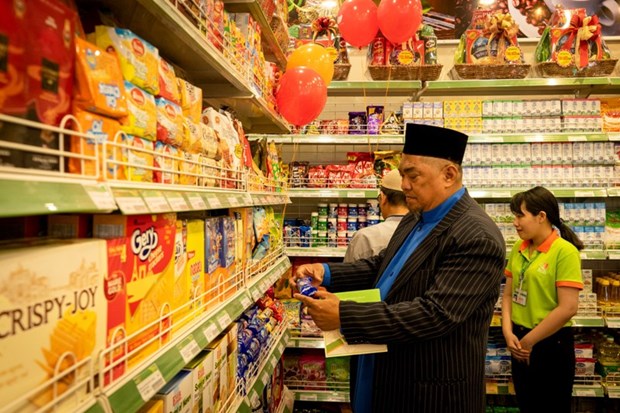The Halal market is a huge market for Vietnamese businesses because currently Vietnamese Halal products do not account for a significant share.

The Halal market is a huge market for Vietnamese businesses because currently Vietnamese Halal products do not account for a significant share.
Nguyen Quoc Dung, Deputy Minister of Foreign Affairs, made the statement at a conference "Halal market in Southeast Asia-South Asia-South Pacific: Potentials and opportunities" held on Monday by the Ministry of Foreign Affairs in co-ordination with the Ministry of Agriculture and Rural Development.
According to Dung, the Southeast Asia - South Asia - South Pacific region is a potential market with 860 million Muslims and Halal consumers, accounting for 66 per cent of the total Muslim population in the world.
Viet Nam has many strengths and favourable conditions to effectively participate in the global Halal economy, including in the pillars of the food, tourism, textiles, pharmaceuticals and media.
Viet Nam has played an important role in many regional and inter-regional economic linkages with 17 FTAs, including new generation FTAs such as the CPTPP, EVFTA and RCEP. Viet Nam also has strengths in producing dry goods such as rice, pepper, cashew nuts and coffee beans.
The global Halal food market is expected to continue to grow strongly. Spending on Halal food is expected to increase by 3.1 per cent from US$1.4 trillion in 2020 to $1.9 trillion in 2024 and $15 trillion in 2050.
The strong demand for Halal products is not only due to an increase of Muslims but also due to new consumption trends. There are many non-Muslims increasing spending and use of Halal food because Halal products meet the criteria of environment and food safety.
Besides that, “the demand for Halal products is also increasing in the domestic market as foreign Muslims come to Viet Nam to travel, work and study more and more. The Muslim community in Viet Nam is also increasing," said Dung.
In addition, Halal products are expected to develop in the terms of food and also pharmaceuticals and cosmetics. Those products would have an increasing influence on the development of tourism, financial, and marketing service industries.
The Halal food industry is not only related to the production process, but also involves many other fields such as raw materials, fertilisers, processing, and logistics, because Halal food is not only a product but also a process from raising, slaughtering, preserving, packing, transporting and distributing to consumers.
Deputy Minister of Agriculture and Rural Development Phung Duc Tien said 50 per cent of Viet Nam’s agricultural products, such as rice, vegetables, tea, coffee, cashew and pepper, meet standards of the Halal market.
Tien said to enter the Halal market, domestic enterprises need to understand cultural, religious beliefs and commitments.
“However, each year, only about 50 Vietnamese companies have been granted Halal certificates. Viet Nam has only had about 20 goods exported to the Halal market, a very low number compared to its potential. Up to 40 per cent of Vietnamese localities do not have Halal certified export products," said Dung.
Deputy Minister Tien hoped that the conference would help find solutions on creating a favourable business environment and supporting Vietnamese agricultural products to access the Halal food market.
Besides that, it is necessary to have sustainable development in Viet Nam's agricultural, forestry and fishery value chains to supply goods for the Halal market in Southeast Asia, South Asia, South Pacific and the world, he said.
At the same time, a common set of Halal certification standards for Southeast Asia, South Asia and South Pacific regions is needed to develop agricultural, forestry and fishery products.
At the conference, experts and managers also said that the local businesses are facing many difficulties in exploiting this market. The reasons include differences in business culture, consumer tastes and especially Halal certificates.
Halal standards tend to be more stringent. The diversity and complexity of regulations on verification and certification of Halal in each country are also obstacles for the enterprises.
Viet Nam has also not had effective international cooperation and links to transfer technology, mobilise capital and participate in the global value chain in the Halal food industry.
Samina Naz, Ambassador of Bangladesh to Viet Nam, said that if Viet Nam holds only 1 per cent of the global Halal market share, it would gain great value. Viet Nam has a very large tourism economic sector, even during the COVID-19 pandemic, this sector is still developing. Culinary tourism is an important field.
Viet Nam can also develop Halal food products for tourists. Foreigners coming to Viet Nam will feel that they are ready to be welcomed in Viet Nam, according to her.
Bangladesh is a large and potential market for halal food products. Naz hoped that the Bangladeshi business community in Viet Nam will participate in chains of producing and supplying Halal products to Bangladesh. Vietnamese investors can come to Bangladesh to invest in cattle breeding development. This is a sector with high demand in Bangladesh.
Tran Viet Thai, Viet Nam's Ambassador to Malaysia, said that Viet Nam's agricultural products exported to Malaysia are still few, mainly rice. The exports are still raw materials and via Thai enterprises. They need to export those products directly to this market.
The enterprises also need to have specific strategies to enter this Halal market from consulting, training, cooperation and investment.
Thai also said that Viet Nam needs to have a unified agency in charge of the Halal market. The Ministry of Agriculture and Rural Development can propose to the Government to build this agency, thereby making it easier for ambassadors to connect.
In addition, there are handbooks on the Halal market. Ambassadors of countries in Viet Nam are ready to support in building those handbooks, he said. — VNS





